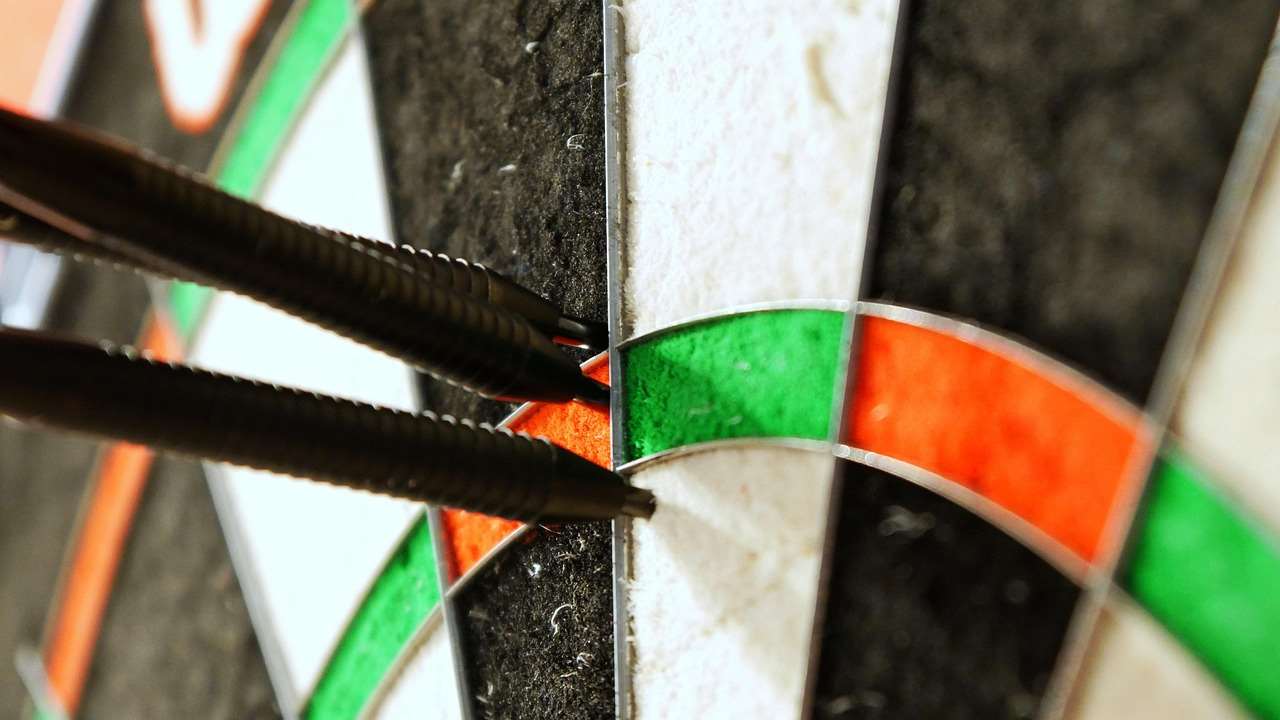The history of darts betting laws mirrors the evolving attitudes toward gambling in general, shifting from periods of strict prohibition to more liberal regulations depending on the jurisdiction. This article explores that journey, from the early days of informal wagers to the complex regulatory landscape we see today, detailing key legislative milestones and their impact on the sport.
⚠️ Still Using Pen & Paper (or a Chalkboard)?! ⚠️
Step into the future! The Dart Counter App handles all the scoring, suggests checkouts, and tracks your stats automatically. It's easier than you think!
Try the Smart Dart Counter App FREE!Ready for an upgrade? Click above!
A Glimpse into the Early History Of Darts Betting Laws
In the early days of darts, betting was largely informal and localized. Pubs and social clubs were the epicenters of the game, and wagers were often placed between individuals or small groups. There was little to no regulation of this activity, reflecting the broader lack of formal gambling laws at the time. These early bets were often small stakes, adding a friendly competitive edge to the matches.
The lack of regulation meant that potential disputes were settled informally, relying on the honor system or the intervention of respected members of the community. While this system worked reasonably well in close-knit environments, it lacked the safeguards of a more formalized regulatory framework. As darts grew in popularity, the need for greater oversight became increasingly apparent. Understanding the Darts Betting And Fantasy Leagues Guide is crucial for any modern darts fan.

The Rise of Formal Gambling Regulations and Darts
As gambling became more widespread and concerns about its potential social and economic impacts grew, governments began to introduce formal regulations. The specifics of these regulations varied significantly from country to country, and even within different regions of the same country. Some jurisdictions adopted a highly restrictive approach, prohibiting most forms of gambling, while others took a more liberal stance, allowing certain types of betting under strict licensing and oversight.
The impact of these regulations on darts betting was uneven. In some areas, betting on darts was effectively outlawed, while in others it was permitted within the broader framework of gambling laws. One significant factor was the perception of darts as a game of skill. In jurisdictions that distinguished between games of skill and games of chance, darts often fell into the former category, making it more likely to be permitted for betting purposes. The evolution of gambling regulations played a crucial role in shaping the landscape of darts betting.
Key Legislation Impacting Darts Betting
- The Betting and Gaming Act (UK): This landmark legislation, introduced in the 1960s, legalized certain forms of gambling in the UK, including betting shops. This had a significant impact on darts betting, as it provided a legal and regulated avenue for placing wagers on the sport.
- State-Level Regulations (USA): In the United States, gambling laws are primarily determined at the state level. This has resulted in a patchwork of regulations, with some states allowing sports betting, including darts, and others maintaining a prohibition.
- Remote Gambling Regulations: The rise of online gambling has prompted governments around the world to introduce regulations specifically targeting remote betting activities. These regulations often cover issues such as licensing, taxation, and consumer protection, and they have a direct impact on online darts betting.
The Impact of Online Betting on Darts
The advent of online betting revolutionized the gambling industry, and darts betting was no exception. Online platforms offered a convenient and accessible way for fans to place wagers on darts matches from anywhere in the world. This led to a surge in popularity for darts betting, as it became easier than ever to participate.
However, the rise of online betting also presented new challenges for regulators. Issues such as cross-border transactions, money laundering, and the protection of vulnerable individuals became increasingly important. Governments responded by introducing new regulations specifically tailored to the online gambling environment.
The ability to bet in-play, while a match is happening, has also significantly changed the landscape of darts betting. This allows for a more dynamic and engaging betting experience, but it also raises concerns about the potential for match-fixing and other forms of corruption. The Bookmaker Sponsorship Professional Darts has been a key factor in the growth of the sport.

History Of Darts Betting Laws: Modern Challenges and Future Trends
Today, the history of darts betting laws continues to evolve as new challenges and opportunities emerge. One of the key challenges is ensuring the integrity of the sport in the face of increasing betting activity. Match-fixing remains a significant concern, and regulators are working closely with sporting organizations to implement measures to prevent and detect corrupt practices.
Another important trend is the growing popularity of mobile betting. Smartphones and tablets have become the devices of choice for many bettors, and online gambling operators are investing heavily in mobile-friendly platforms. This trend is likely to continue in the years to come, further blurring the lines between traditional and online betting.
Protecting the Integrity of Darts
- Anti-Corruption Measures: Sporting organizations and regulators are implementing a range of anti-corruption measures, including player education programs, monitoring of betting patterns, and strict penalties for those found guilty of match-fixing.
- Collaboration and Information Sharing: Effective regulation of darts betting requires close collaboration between different stakeholders, including sporting organizations, gambling operators, law enforcement agencies, and international regulatory bodies.
- Technological Solutions: Technology is playing an increasingly important role in detecting and preventing match-fixing. Sophisticated algorithms can be used to identify suspicious betting patterns, and data analytics can help to uncover potential links between players, officials, and criminal elements.
The Role of Sponsorship in Darts Betting
Sponsorship plays a significant role in the relationship between darts and betting. Betting companies are often major sponsors of darts tournaments, teams, and players. This provides valuable financial support for the sport, but it also raises ethical concerns about the potential for conflicts of interest and the promotion of gambling to vulnerable individuals. The Betting Sponsorship Impact On Darts can be both positive and negative.
Regulators are increasingly scrutinizing sponsorship deals between betting companies and sporting organizations. Some jurisdictions have introduced restrictions on gambling advertising and sponsorship, while others are considering similar measures. The goal is to strike a balance between allowing betting companies to promote their products and protecting the public from the potential harms of gambling.
Ethical Considerations in Darts Betting
Beyond the legal framework, there are also important ethical considerations related to darts betting. These considerations include the responsibility of gambling operators to promote responsible gambling practices, the need to protect vulnerable individuals from gambling-related harm, and the potential for conflicts of interest arising from sponsorship deals.
Responsible gambling initiatives, such as self-exclusion programs and deposit limits, are becoming increasingly common in the online betting industry. These initiatives aim to empower individuals to manage their gambling habits and prevent them from developing problem gambling behaviors. Education and awareness campaigns are also important in promoting responsible gambling practices and reducing the stigma associated with gambling addiction.
Responsible Gambling Tips
- Set a Budget: Before you start betting on darts, decide how much money you are willing to spend and stick to your budget.
- Gamble for Entertainment, Not Profit: Darts betting should be seen as a form of entertainment, not a way to make money. Don’t chase your losses or bet more than you can afford to lose.
- Take Breaks: It’s important to take regular breaks from betting to avoid becoming too immersed in the activity.
- Seek Help if You Need It: If you think you may have a problem with gambling, don’t hesitate to seek help from a professional organization or support group.
Darts Betting and Media Coverage
Media coverage plays a crucial role in shaping public perceptions of darts betting. Positive coverage can help to legitimize the activity and attract new bettors, while negative coverage can raise concerns about its potential harms. The way in which darts betting is portrayed in the media can also influence the attitudes and behaviors of individuals, particularly young people. The Betting Sponsorship Media Coverage is a complex issue.
Responsible media reporting on darts betting should focus on providing accurate and balanced information, highlighting the potential risks as well as the potential benefits. It should also avoid sensationalizing or glamorizing gambling, and it should promote responsible gambling practices.

The Future of Darts Betting Laws
The future of darts betting laws is likely to be shaped by a number of factors, including technological advancements, evolving public attitudes towards gambling, and the ongoing efforts to combat match-fixing and other forms of corruption. As new technologies emerge, regulators will need to adapt their approaches to ensure that darts betting remains fair, safe, and transparent.
One potential trend is the increasing use of data analytics and artificial intelligence to monitor betting patterns and detect suspicious activity. These technologies can help to identify potential cases of match-fixing more quickly and accurately, allowing regulators to take appropriate action. Another trend is the growing emphasis on consumer protection, with regulators introducing stricter rules to protect vulnerable individuals from gambling-related harm.
Understanding the nuances of the legal and regulatory environment for darts betting is essential for anyone involved in the sport, whether as a player, a fan, or a gambling operator. As the landscape continues to evolve, it will be important to stay informed about the latest developments and to adapt accordingly.
Regional Variations in Darts Betting Regulations
It’s crucial to recognize that regulations governing darts betting vary considerably across different regions and countries. For instance, the United Kingdom boasts a relatively liberal framework, whereas many countries maintain stricter controls, sometimes outright prohibitions on specific types of betting activities.
These variations stem from differing cultural norms, historical perspectives on gambling, and the specific priorities of each jurisdiction. Consequently, anyone engaging in darts betting, especially online, should always ascertain that their activities comply fully with the laws of their specific locale. Ignoring these variations can lead to serious legal repercussions. The How Betting Companies Sponsor Darts is often impacted by regional regulations.

Conclusion: Navigating the History Of Darts Betting Laws
The history of darts betting laws is a complex and ever-evolving story. From its humble beginnings in pubs and clubs to the sophisticated online platforms of today, darts betting has been shaped by a variety of factors, including technological advancements, changing social attitudes, and the ongoing efforts to regulate the gambling industry. Understanding the legal and ethical considerations surrounding darts betting is essential for all stakeholders, ensuring the integrity and sustainability of the sport. Stay informed, gamble responsibly, and always comply with the laws of your jurisdiction. To learn more about the overall impact of betting companies on darts, review Impact Betting Sponsorship Darts.
Hi, I’m Dieter, and I created Dartcounter (Dartcounterapp.com). My motivation wasn’t being a darts expert – quite the opposite! When I first started playing, I loved the game but found keeping accurate scores and tracking stats difficult and distracting.
I figured I couldn’t be the only one struggling with this. So, I decided to build a solution: an easy-to-use application that everyone, no matter their experience level, could use to manage scoring effortlessly.
My goal for Dartcounter was simple: let the app handle the numbers – the scoring, the averages, the stats, even checkout suggestions – so players could focus purely on their throw and enjoying the game. It began as a way to solve my own beginner’s problem, and I’m thrilled it has grown into a helpful tool for the wider darts community.